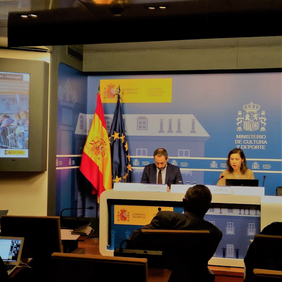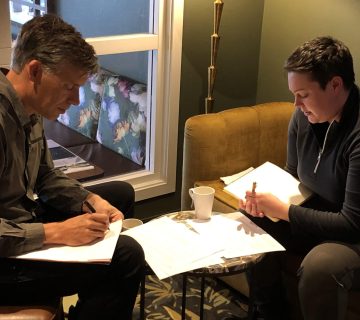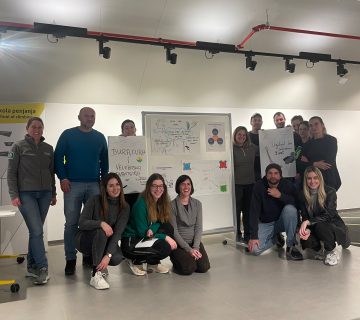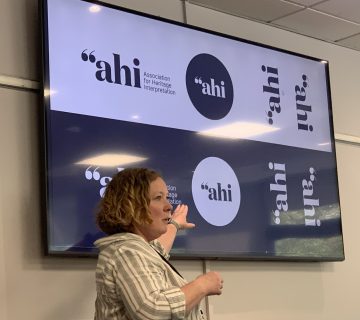This first seminar of this European project, which was held at the Ministry of Education, Culture & Sports, was a European Year of Cultural Heritage (EYCH) closing event for Spain. It was attended by the European Commission, the Council of Europe, representatives from the Ministry of Culture, different autonomous communities, representatives from Andorra, Cyprus, Greece, Italy, Portugal, France and Turkey, as well as non-profit civil society organisations related to heritage.
The Faro Way project, prepared by the European Commission and the Council of Europe, aims to promote the adoption of the Faro Convention by national authorities. During the two-day seminar, the role heritage can play among society was debated and dominated the programme. Some other key points were also considered, such as: how to address social participation, the importance of a wider understanding of heritage where people are at the centre, and the need to reconnect Europeans by highlighting core values through heritage.
The Faro principles and the need of such framework was fully explained together with study cases from other countries, in order to share how to apply this tool. There was no doubt among the participants of the huge potential that heritage brings for participation. The Faro Way does not really create mandatory actions, or specific obligations. It suggests, rather than imposes. It defines principles and areas of action where signatories should be addressed and stakeholders receive the impact.
Among the speeches, firstly, the promotion of a wider understanding of heritage and its relationship with the common cultural heritage and society was discussed. Some intangible aspects might be taken into consideration, for example, the perception of the people, the diverse interpretation applications and the conflict-dialogue resolution approach. The public action proposed was to develop a democratic participation, where human individual and collective rights should be identified.
Secondly, the importance of meanings and uses that people attach to cultural heritage and the values that it represents. Here, the interaction between people, places and stories was highlighted. It is here where cultural heritage is considered as a resource for sustainable development with a strong economic potential, where societal challenges may be addressed, where trust and mutual understanding can be promoted and a way to reinforce social cohesion and shared responsibility. The participants agreed from each perspective that cultural heritage policy design needs to be included in Action Plans.
In order to improve awareness and access to cultural heritage, The Faro Way recommends a three-step strategy, namely: education, new technologies and greater involvement. Cultural heritage may be included in the educational curriculum and on the research agenda, thus new technologies allow a re-proposition of a creative application to the heritage and lastly encouraging everyone to participate. There is a specific need then to develop innovative approaches that fit within the general framework.
The role of local authorities on heritage throughout their policies and laws is somehow adopted already but there was a general suggestion to take a bigger view with an integrated approach on cultural heritage, and a greater cooperation with stakeholders, meaning: joint action.
The Faro Way covers three dimensions: cohesion, endangered heritage and innovative practices, not forgetting the role interpretation can play to involve heritage communities. Nowadays the situation is a bit more balanced as society joins in some cases the management of heritage. They have the right to enjoy the heritage but also to offer their opinions for the management of it, aligned with democratic principles. It was evident that, despite the differences between contexts in EU countries, The Faro Way is the way to work collaboratively, with the need for narratives to cover the diversity of interpretations, and the establishment of processes for conciliation. Cultural heritage at its very beginning has a quality of life goal, and recognising a responsibility towards cultural heritage may help to develop ways to cooperate. There is a need to count with the presence of people who can convey the message as facilitators, so Interpret Europe seems to be a stakeholder with a civil society voice on that too.
Nuria Mohedano is a Sustainable Tourism Specialist working as a consultant for destinations and small companies. She is IE’s Tourism Coordinator. She can be contacted at: nuria.mohedano@interpret-europe.net
To cite this article:
Mohedano, Nuria (2018) ‘The Faro Way and the importance of heritage interpretation’. In Interpret Europe Newsletter 4-2018, 8.
Available online:
www.interpret-europe.net/fileadmin/Documents/publications/Newsletters/ie-newsletter_2018-4_winter.pdf




